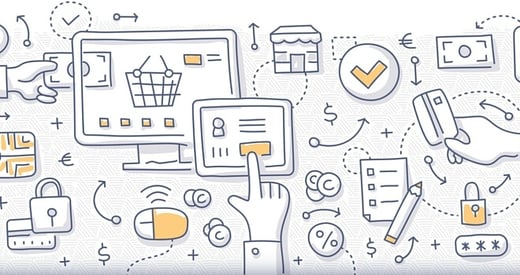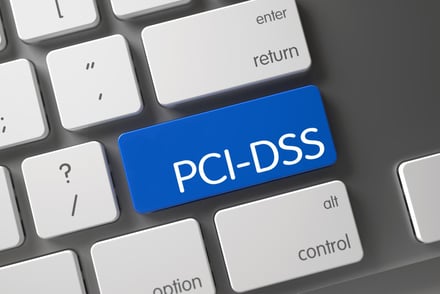Any organization that accepts or processes payment cards shares a responsibility: protecting cardholder data and the trust that comes with it. PCI compliance refers to meeting the security requirements established by the Payment Card Industry Data Security Standard (PCI DSS), a global benchmark designed to reduce fraud and safeguard sensitive financial information.
The most current version, PCI DSS v4.0.1, refines expectations introduced in v4.0 and reinforces a central theme:
Effective payment security requires continuous oversight, not a once-a-year certification exercise.
Whether card transactions happen online, at a point-of-sale terminal, or through a third-party service, PCI compliance helps ensure those transactions remain secure and trustworthy.
In fact, worldwide fraud losses on card payments hit $34 billion in 2022 and are projected to exceed $43 billion by 2026.
What is PCI Compliance — and Why Does It Exist?
PCI DSS is a set of security requirements maintained by the Payment Card Industry Security Standards Council (PCI SSC), created by major card brands to improve global payment security, and is required for all businesses that store, process, or transmit payment card data.
Although PCI DSS is not a government regulation, such as HIPAA or FISMA, compliance is contractually required by payment processors and acquiring banks. Meeting the standard demonstrated that an organization is taking appropriate steps to protect cardholder data and reduce the risk of fraud. Since its introduction nearly two decades ago, its latest version, PCI DSS 4.0.1, covers an extensive range of processes, requirements, and technology, such as Targeted Risk Analyses and Network Security Controls.
Who Needs to Comply with PCI DSS?
PCI DSS applies broadly. Any business — large or small — that stores, processes, or transmits cardholder data falls under its scope. This includes merchants and service providers supporting payment environments, regardless of industry or transaction volume.
Even organizations using fully outsourced payment platforms may still need to validate compliance with certain controls, depending on how their systems interact with payment data.
Who Oversees PCI Compliance?
The PCI SSC (Payment Card Industry Security Standards Council) is an independent organization founded in 2006 by American Express, Discover, JCB International, MasterCard, and Visa Inc. to regulate and implement security standards for cardholder information.
Their website describes their organization as "a global forum that brings together payments industry stakeholders to develop and drive adoption of data security standards and resources for safe payments worldwide."
While the council publishes and maintains the standard, it does not enforce it directly.
Enforcement comes from:
- Card brands (e.g., Visa, MasterCard, Discover, American Express, JCB)
- Acquiring banks and payment processors that underwrite and support merchants
In practice, PCI compliance obligations flow down through your merchant agreement. Card brands set expectations, the PCI Council defines the requirements, and acquiring banks hold businesses accountable for meeting them.
This structure often surprises leaders expecting federal or industry regulators to fill the role. Instead, PCI DSS is governed through the payment ecosystem itself — a private-sector security standard with global reach.
What Does PCI DSS Require?
PCI DSS addresses security across people, technology, and process disciplines. In practical terms, it requires organizations to:
- Control and monitor access to payment systems
- Enforce secure configurations and protect system components
- Encrypt and safeguard sensitive data
- Log and review system activity
- Test security controls routinely
- Maintain policies, governance, and security awareness
The PCI DSS remains anchored by the familiar set of 12 core security requirements, which cover access control, network security, system hardening, vulnerability management, monitoring, and policy. In PCI DSS v4.0.1, these requirements remain intact, with a clearer emphasis on demonstrating that controls operate effectively on an ongoing basis, not only during annual reviews.
Organizations can follow either a Defined Approach (prescriptive requirements) or a Customized Approach, supported by documented risk analysis and validation. Both methods must achieve the same security intent.
See A Beginner's Guide to PCI Compliance for more information on the 12 core security requirements of PCI-DSS compliance.
Business Value Beyond Compliance
While PCI DSS is a contractual requirement, its impact extends beyond meeting obligations. Effective payment security reinforces customer trust, reduces the likelihood of business disruption, and strengthens operational discipline. Organizations that embed PCI practices into broader security and governance programs typically see more transparent accountability, improved visibility across systems, and smoother audit cycles. Compliance becomes a byproduct of doing security well, rather than a "point-in-time" exercise.
The entire process may seem complicated, but all it requires is finding a partner who will not only assist you in complying with PCI but also continuously monitor your payment card system for compliance.
According to the 2024 Verizon Data Breach Investigations Report, payment data remains a significant target in financially motivated attacks, reinforcing the need for consistent control operations and ongoing validation (not just annual certification work).
Why PCI Focuses on Continuous Security
Payment environments evolve constantly. PCI DSS Version 4 reflects this reality by emphasizing:
- Repeatable, documented processes
- Evidence that controls are operating effectively
- Monitoring for unauthorized activity or configuration drift
- Routine risk evaluation and system updates
- Control assurance between annual assessments
In summary, sustained security matters more than passing a yearly audit.
What Happens if a Business is Not PCI Compliant?
Consequences vary, but may include:
- Fines or fees from payment brands or banks (ranging from $5,000 to $100,000)
- Increased processing costs
- Required forensic reviews after incidents
- Suspension of card-processing privileges in serious cases
- Negative impact on reputation, customer trust, and stock values
Even organizations that previously passed a PCI compliance assessment may face penalties if controls were not maintained consistently and a breach occurs.
Can Any Single Tool Make You PCI Compliant?
No single tool delivers PCI compliance on its own. PCI DSS requires clear governance, secure system configuration, documented processes, and continuous control operation. Tools don't replace accountability; they help enforce it.
However, the right technology can support multiple PCI requirements at once by validating system integrity, monitoring for unauthorized changes, and providing audit-ready evidence. In practice, organizations that combine strong processes with visibility into their environment find it easier to sustain compliance and prove that controls are working between formal assessments.
How Integrity Monitoring Supports PCI Compliance
PCI DSS v4.0.1 stresses maintaining trusted system configurations and proving that controls are functioning continuously. File Integrity Monitoring (FIM) supports this expectation by providing teams with visibility into when critical systems change and whether those changes were approved.
CimTrak helps organizations:
- Detect and alert on unauthorized or unexpected system changes
- Maintain and verify known-good system baselines
- Produce evidence to support PCI audits and control validation
- Demonstrate that systems remain in a secure state between assessments
These capabilities align with the intent of Requirements 10 (log and monitor activity) and 11 (test and validate security controls, including change-detection mechanisms) by strengthening oversight and documentation around system behavior. Integrity and change-detection mechanisms support PCI DSS Requirements 10 and 11 by monitoring critical assets, validating changes, and demonstrating ongoing compliance.
Maintaining Trust in the Payment Environment
Maintaining trust in payment systems requires confidence that critical systems remain secure and unchanged unless authorized. CimTrak helps organizations detect unauthorized modifications, validate system integrity, and preserve evidence to support continuous control assurance — reinforcing the operational discipline emphasized in PCI DSS Version 4.
To learn how integrity assurance supports PCI DSS requirements and continuous compliance practices, download our CimTrak Solution Brief for PCI 4.0.1.
Tags:
Compliance.png?width=50&height=50&name=Kayla%20%20(1).png)
November 6, 2025




